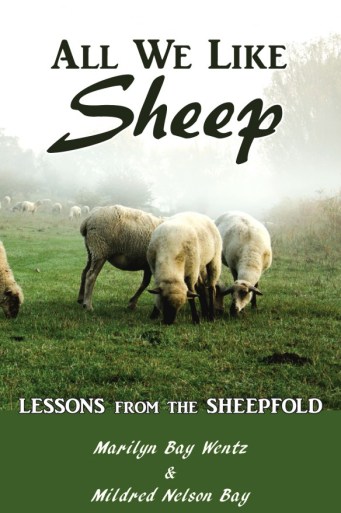
I hear someone saying, “Lambs are cute and woolly, and all that. But aren’t sheep ‘dumb’ and helpless creatures? I’m not sure I want to be like a sheep.”
In answer, I’ll offer a few snippets of Bible verses:
“I am the Good Shepherd.”
“My sheep hear my voice.”
“Follow me.”
“Like sheep without a shepherd”
“Beware of wolves in sheep’s clothing.”
“The Lord is my shepherd.”
“He leads me beside still waters.”
“He makes me lie down in green pastures.”
“His rod and staff comfort me.”
“We are his people, the sheep of his pasture.”
“We all, like sheep, have gone astray.”
“I lay down my life for the sheep.”
“Oh. Well. When He puts it that way … I’ll follow Him like a sheep if that’s what it takes to hear His voice, know His goodness, enjoy those green pastures and still waters, live the life He made possible by laying down His own. … But, what does that mean in real life? for me? How does this sheep thing work?”
I’m glad you asked. God the Father gave us this picture of His sheep in His pastures. He even sent His Son to be the Lamb that takes away the sins of the world. But He knew it would be hard for us to fathom such love and all the nuances of such a lamb-like life of trust. So He provided human under-shepherds. And He provided some earthy, mucking-in-the-barn and traipsing-in-the-pastures, shepherds of flocks. These people know sheep. They can tell us a lot about those creatures that God says we are like.
“I’ll bet those shepherds could tell some stories! From what the Bible says, sheep can get into a lot of trouble.”
In fact, I have two friends who are shepherds of sheep. Their names are Marilyn and Millie, two women who have raised thousands of lambs and tended flocks on their farms in Colorado. They have given names to many of their lambs and gotten to know their individual sheep quirks and personalities. They’ve nursed sick sheep, bottle-fed orphan lambs, called flocks in from the pasture, protected them from marauding dogs and hungry coyotes. They’ve laughed at sheep antics and cried over their losses and vulnerabilities.
“I’d like to meet those shepherdesses and visit the sheep farm, but I don’t suppose I ever will.”
But you can! Vicariously. Just read Marilyn and Millie’s book of sheep stories. They’ll even help you better understand how to follow the Good Shepherd “like a sheep of His pasture.”
“Great! Where can I get their book?”
Right here:
http://amzn.com/0989101436
And you can find out more here:
http://cladach.com/all-we-like-sheep/
Remember, keep listening for the Shepherd’s voice. You can trust Him implicitly!









 All We Like Sheep, a mix of creative memoir and Bible-centered devotional, was conceived from the heart and experience of this mother-daughter duo. “People see flocks of sheep grazing in the mountains or on the plains but understand little about the joys and trials of herding sheep,” says Bay. “Stories in All We Like Sheep: Lessons from the Sheepfold help the reader understand sleepless nights of lambing, attacks on the ewes by rogue dogs and coyotes, the bond experienced when the lambs respond to the shepherd’s voice, or how sheep protect themselves and ewes always recognize their own lambs.”
All We Like Sheep, a mix of creative memoir and Bible-centered devotional, was conceived from the heart and experience of this mother-daughter duo. “People see flocks of sheep grazing in the mountains or on the plains but understand little about the joys and trials of herding sheep,” says Bay. “Stories in All We Like Sheep: Lessons from the Sheepfold help the reader understand sleepless nights of lambing, attacks on the ewes by rogue dogs and coyotes, the bond experienced when the lambs respond to the shepherd’s voice, or how sheep protect themselves and ewes always recognize their own lambs.”







